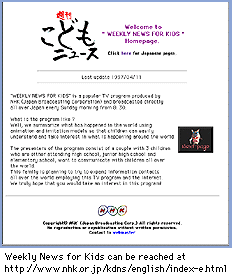 |
What kind of TV shows do Japanese kids watch? |
 |
On average, kids attending elementary schools (aged six to 12) watch two hours and 25 minutes of TV a day when they have school and about three hours and 20 minutes on their days off. For junior high school students (aged13 to15), the average is two and a quarter hours on weekdays and three hours and 14 minutes on weekends. Cartoons are big with elementary schoolchildren. So are broadcasts of baseball and soccer games. Programs about animals and quiz shows are often seen together with the entire family. Sometimes TV programs are seen in the classroom. They can help explain difficult science and social studies problems. And a class might watch a TV drama that makes you think about what's right and wrong, which could then be discussed by students. Webpage image courtesy of NHK (Japan Broadcasting Corporation). |
 | |
 Girls aged 10 or over like watching their favorite stars on music programs,
dramas, quiz and talk shows, and comedies. Boys and girls in their early
teens often watch sports broadcasts in addition to music shows and dramas.
Girls aged 10 or over like watching their favorite stars on music programs,
dramas, quiz and talk shows, and comedies. Boys and girls in their early
teens often watch sports broadcasts in addition to music shows and dramas.
